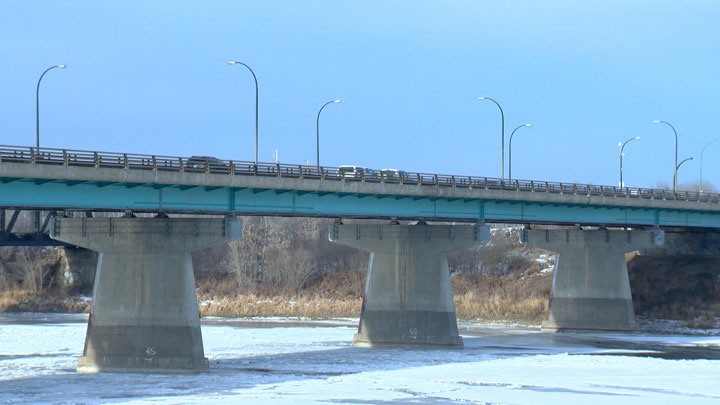Regular Prince Albert, Sask., commuters have been spared their loose change following city council’s decision to back out of a proposed toll on the Diefenbaker Bridge.

Council voted down the proposal at its Jan. 27 meeting after a letter from Saskatchewan’s highways minister said a toll could impact the city’s funding under the Urban Highway Connector Program (UHCP).
The city receives around $200,000 in funding annually under the program.
Prince Albert’s mayor said he will continue to advocate for a new crossing.
“I’m not pushing the province about the bridge. I’m poking them with a stick that they don’t forget about it. And the biggest stick I’m poking them with is they funded that new north bridge in Saskatoon — the Chief Mistawasis Bridge. They’re disappointed that there’s only 9,200 cars a day crossing it,” Greg Dionne said.
He’s focused on securing funding for a new hospital but wants to continue working with the province on both fronts.

Get breaking National news
A city report said revenue from the tolls could go towards bridge maintenance, bringing down property taxes or a second crossing.
The province is responsible for most of the costs of Diefenbaker Bridge.
The Saskatchewan Progressive Conservatives have been vocal about a second crossing in the city, but aren’t sure if the day will ever come.
“If they’re going to be steadfast on the city coming up with a portion of the money, then obviously that’s up for the city to decide. It’s no secret that we really can’t afford that right now. I guess if that’s going to be an issue, then we will not get a bridge,” said deputy leader Shaun Harris.
A city report found more than 24,000 vehicle trips are taken every day over the bridge with more than 75 per cent of those trips travelling through the city.
In an email to Global News, the province said municipalities have a number of options for grants for infrastructure funding alongside the Saskatchewan and federal governments.
These options include the Municipal Revenue Sharing (MRS) program, the federal Gas Tax Fund and the Investing in Canada Infrastructure Program (ICIP).
The ICIP provides funding based on four investment streams:
- green infrastructure;
- community, culture and recreation infrastructure;
- public transit infrastructure; and
- rural and northern communities infrastructure.
Officials said recipients have until March 31 to submit applications for green infrastructure and community, culture, and recreation infrastructure under ICIP. They added future application intakes for all streams of ICIP, including roads and bridges, are currently being planned but a timeline has yet to be established.






Comments
Want to discuss? Please read our Commenting Policy first.